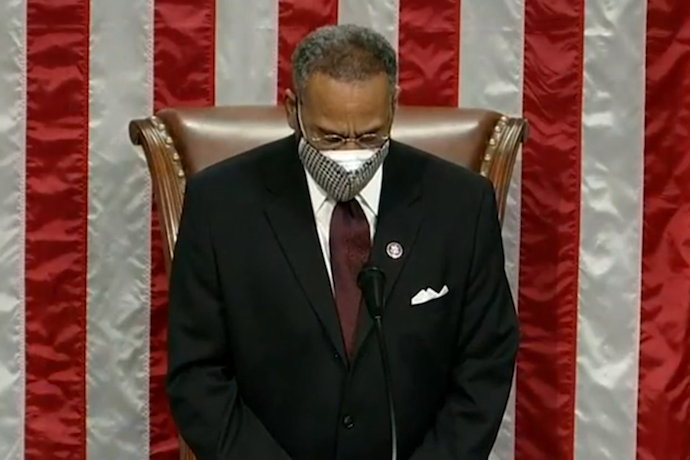Amen and awoman. Exclusion and inclusion. Division and diversity. Religion and nonreligion. Rep. Cleaver (D-MO) ignited these flammable dichotomies delivering the House’s opening prayer for this session and ending it:
“We ask it in the name of the monotheistic God, Brahma, and God known by many names and by many different faiths. Amen, and awoman.”
The prayer might have been written by Saul Bellow’s Good Intentions Paving Company. But good intentions matter little when the underlying act is improper. Cleaver is an ordained minister and U.S. Representative—combining those two roles is never a good idea. Deep down, Cleaver seems to have been attempting inclusion and humor, but by mixing religion and government, he angered nearly everyone.
Theologically, objections abound, but those are questions for churches and theologians to grapple with, not our government.
Cleaver’s good intention stemmed from the House’s new rules that are meant to include all gender identities, in part by changing “pronouns and familial relationships in the House rules to be gender-neutral or remov[ing] references to gender” where possible. Cleaver’s “awoman” was meant to be a cute nod to these new, groundbreaking rules, to the record number of women in Congress, and, perhaps, a shout out to Congress’s first female chaplain. (Yes, Congress has chaplains. We spend $800,000 a year on them.)
The problem is that it wasn’t cute, it was divisive. And “awoman” isn’t even a Cleaver original. It’s an old feminist joke, one that crosses cultural lines and stems from the a long tradition of pushing back against patriarchal Christianity. When Elizabeth Cady Stanton was fighting for women’s equality, she wrote an 1896 essay entitled, “The Degraded Status of Woman in the Bible.” The title says it all, but Stanton was never one to equivocate: “So far from woman owing what liberty she does enjoy to the Bible and the church, they have been the greatest block in the way of her development.” I’ve heard my boss, Annie Laurie Gaylor, a feminist author and activist in her own right, make this same joke on countless occasions, including on a webshow last month.
But as Christopher Hitchens once wrote, “The literal mind can never understand the ironic mind.” The Christian Nationalists were as humorless and theocratic as always, responding to “awoman” with fiery denunciations worthy of a preacher slinging hellfire and brimstone from the pulpit. The denunciations are predictable and not worth repeating. There was much mansplaining about the origins of the word “amen,” some of it erroneous and included a whiff of racism in the insinuations that an ordained minister doesn’t know what “amen” means.
In this context, it’s not the joke that’s problematic, but the government prayer. All of that conservative Christian piss and vinegar misses a more basic point: a secular government ordained by “We the People” should not be praying at all. This is not to say legislators cannot pray if they wish, they are free to do so. And they may pray to whichever gods care to listen and end their prayers with the verbal flourish or fetish of their choosing. But they should not do so with a government microphone, and not on the taxpayers’ time and dime.
We’ve seen plenty of divisive prayers from the conservative side. Often deliberately so, wielding prayer like a cudgel. The Pennsylvania legislator’s Jesus-laden, jaw-dropping prayer uttered to intimidate the state’s first female Muslim legislator. A preacher echoed this prayer, telling the Virginia House of Delegates that “every knee will bow and every tongue will confess that Jesus is Lord.” The Georgia House suffered through a sermon and then a prayer, both of which condemned all non-Baptists to an eternity of torture and torment.
With the “awoman” line, they finally got a taste—the smallest sample—of what it’s like for some of the rest of us; for the nonreligious, the religious minorities, the non-Christians, the Christians who agree with Jesus’s words in the Sermon on the Mount, “when you pray, do not be like the hypocrites, for they love to pray standing in the synagogues and on the street corners to be seen by others.” They’re upset because Christianity wasn’t being promoted in the manner to which they are accustomed.
But any prayer, even the prayer that strives, with the best of intentions, for inclusion, is going to be exclusionary. Government prayer will always be divisive in America. We are a pluralistic society made of people from many religious backgrounds and 80 million who are not religious at all. The Founding Fathers chose to keep state and church separate precisely because religion is divisive. It always has been and it always will be, no matter how good one’s religious intentions are.
Rep. Cleaver intended to be inclusive with this prayer, but he did just what his name suggests, just what the Founders feared, and just what our Constitution is meant to prevent—he divided the country along religious lines. Prayer at legislative sessions, which could easily be done by the truly pious legislators without a government microphone and resources, divides, cleaves, and sunders citizens along religious lines while pretending to unite us all. Any politician who truly wants to unite the country and wants to be inclusive of all citizens, ought to keep religion and government separate.


